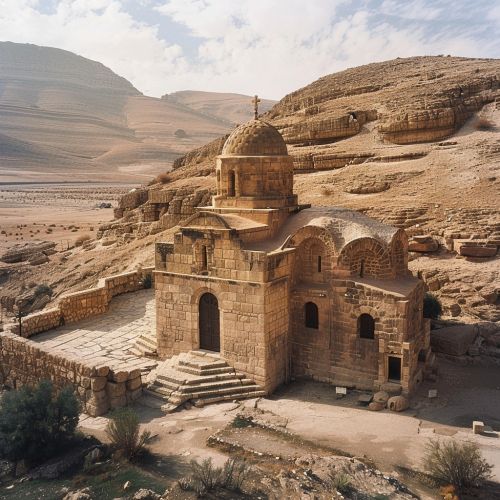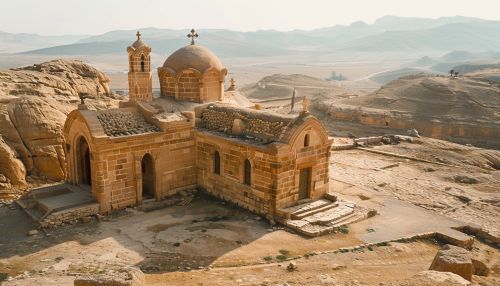Christian Persecution in the Middle East
Historical Context
Christian persecution in the Middle East has a long and complex history, deeply intertwined with the region's religious, political, and social dynamics. The Middle East, often referred to as the cradle of Christianity, has seen the rise and fall of numerous empires and the spread of various religions, including Islam, which has had a significant impact on the Christian communities.
Early Christianity and the Roman Empire
Christianity emerged in the 1st century CE within the Roman Empire, particularly in the region of Judea Province. Early Christians faced persecution from the Roman authorities, who viewed the new faith as a threat to the traditional Roman religious and social order. The Diocletianic Persecution (303-311 CE) was one of the most severe, leading to the martyrdom of many Christians.
Islamic Conquests and the Dhimmi Status
With the rise of Islam in the 7th century, the Middle East underwent significant changes. The Muslim conquests led to the establishment of Islamic rule over vast territories, including regions with significant Christian populations. Under Islamic rule, Christians were granted the status of dhimmis, a protected but subordinate class. They were allowed to practice their religion but faced various restrictions and had to pay the jizya tax.


The Crusades and Mamluk Rule
The Crusades (1096-1291 CE) were a series of religious wars initiated by the Latin Church to reclaim the Holy Land from Muslim rule. These conflicts led to significant upheaval and violence, affecting both Muslim and Christian communities. Following the Crusades, the Mamluks took control of the region, and Christians continued to live under dhimmi status, facing periodic persecution and discrimination.
Ottoman Empire
The Ottoman Empire (1299-1922 CE) brought a new era of rule in the Middle East. Christians, like other non-Muslim communities, were organized into millets, autonomous religious communities with their own leaders and laws. While the millet system provided a degree of autonomy, Christians still faced social and legal discrimination. The Armenian Genocide (1915-1917) during World War I was a tragic example of mass persecution, resulting in the deaths of an estimated 1.5 million Armenians, many of whom were Christians.
Modern Era
The 20th and 21st centuries have seen significant changes in the Middle East, with the rise of nation-states, political upheavals, and ongoing conflicts. These developments have had profound effects on Christian communities.
Post-Ottoman Period
Following the collapse of the Ottoman Empire, the Middle East was divided into various nation-states under the Sykes-Picot Agreement. The creation of these new states often led to instability and conflict, impacting religious minorities, including Christians. In some countries, Christians were able to integrate and contribute to society, while in others, they faced persecution and marginalization.
Arab-Israeli Conflict
The Arab-Israeli conflict has had a significant impact on Christian communities in the region. In Palestinian territories, Christians have found themselves caught between the larger Muslim and Jewish populations, facing challenges related to political instability, economic hardship, and emigration.
Rise of Islamist Movements
The rise of Islamist movements in the late 20th and early 21st centuries has led to increased persecution of Christians in some parts of the Middle East. Groups like Al-Qaeda and ISIS have targeted Christians through violence, forced conversions, and destruction of churches. The Syrian civil war and the Iraq war have further exacerbated the situation, leading to significant displacement and emigration of Christian populations.
Current Situation
Today, Christian persecution in the Middle East varies significantly by country and region. While some countries provide relative freedom and protection to Christian communities, others continue to see significant persecution and discrimination.
Egypt
In Egypt, Christians, primarily Coptic Christians, face periodic violence and discrimination. Despite being the largest Christian community in the Middle East, Copts have experienced church bombings, attacks on individuals, and legal restrictions on building and repairing churches.
Iraq
In Iraq, the Christian population has dramatically decreased due to ongoing violence and instability. The rise of ISIS led to severe persecution, with many Christians fleeing the country or being internally displaced. Efforts to rebuild and return to their homes continue, but challenges remain.
Syria
The Syrian civil war has had a devastating impact on Christian communities. Many have been displaced or have fled the country due to violence from various factions, including Islamist groups. The future of Christianity in Syria remains uncertain as the conflict continues.
Iran
In Iran, Christians, particularly those who have converted from Islam, face severe persecution. The government imposes strict regulations on religious practice, and converts can face imprisonment, harassment, and even execution.
Lebanon
Lebanon has a unique political system that includes significant representation for Christians. However, the country’s ongoing political and economic crises have led to emigration and challenges for the Christian community.
See Also
- History of Christianity in the Middle East
- Religious Persecution
- Islamic History
- Middle Eastern Politics
- Human Rights in the Middle East
